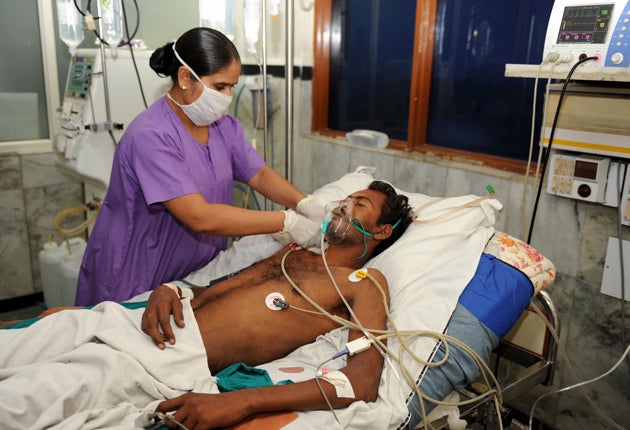Kidney patients add to risk by having transplants abroad
One-fifth of British Asians who buy new organs outside the UK die within three months of operation

Your support helps us to tell the story
From reproductive rights to climate change to Big Tech, The Independent is on the ground when the story is developing. Whether it's investigating the financials of Elon Musk's pro-Trump PAC or producing our latest documentary, 'The A Word', which shines a light on the American women fighting for reproductive rights, we know how important it is to parse out the facts from the messaging.
At such a critical moment in US history, we need reporters on the ground. Your donation allows us to keep sending journalists to speak to both sides of the story.
The Independent is trusted by Americans across the entire political spectrum. And unlike many other quality news outlets, we choose not to lock Americans out of our reporting and analysis with paywalls. We believe quality journalism should be available to everyone, paid for by those who can afford it.
Your support makes all the difference.Transplant patients who buy kidneys overseas are much more likely to die or suffer serious complications, according to new research.
One in three British Asians who paid for a kidney transplant in countries such as Pakistan either died or the donor kidney failed – six times the rate among those who received transplants from live donors in the UK.
One in every five so-called "transplant tourists" died within three months of the operation and 40 per cent suffered life-threatening infections including hepatitis B and C, according to a study of patients in the West Midlands.
Britons who originate from the Indian subcontinent are five times more likely to suffer from renal failure than the general population because of a genetic predisposition and high rates of diabetes and high blood pressure, which can cause kidney disease. However, they wait much longer for transplants due to a shortage of donors with compatible antibodies and blood groups, as organ donation among Asians, and all ethnic minority groups, is low.
NHS Blood and Transplant figures last night showed 9,715 people waiting for a new kidney. While 1,516 on the list are Asian, only 103 kidneys were donated by people from Asian communities last year.
Anecdotal evidence suggests Asian women in particular are reluctant to accept organs from family members in case they suffer harm. Quick funerals are important in religions such as Islam, and harvesting organs can take several hours. There are also misconceptions among some about whether organ donation is acceptable within their culture or religion. It is harder, though not impossible, to find a suitable donor from a different ethnic group.
The new research, published in the medical journal Transplantation, comes amid growing concern about the rise in transplant tourism.
Pakistan, where the sale of organs remains legal, has become one the world's most popular places for foreigners in search of new kidneys. Around two-thirds of all live-donor transplantations in Pakistan are believed to be for foreigners, according to a 2007 study published in the journal Transplant International.
Researchers found high levels of exploitation of paid donors, the majority of whom are poor, illiterate bonded workers. The sale of organs was condemned inan international agreement in 2008, after it was revealed that the vast majority of donors suffer health problems while gaining little economic benefit.
Dr Jyoti Baharani, a specialist from Birmingham Heartlands Hospital and co-author of the report, said: "People know Asians wait longer, so if they've heard of someone from their village back home having a transplant, they will consider it. But, at the end of the day, you're buying someone's kidney without knowing the risks.
"If people are not on the transplant list here it is for a good reason; so if they do travel, it is at their own risk – a 30 per cent risk the kidney won't work or they won't survive. The way to sort this out is to increase awareness and increase donors from within families."
In the West Midlands study, 40 patients were identified as transplant tourists between 1996 and 2006. Two-thirds travelled to Pakistan, the others to countries such as India and the Philippines, even though, in the UK, several were not considered ready for transplantation. These patients were four times more likely to die after one year than those who remained on dialysis.
The number of kidney transplants has increased by 40 per cent in the past five years due to better co-ordination of NHS services and successful campaigns to encourage live and dead organ donation. But increasing levels of obesity, alcohol abuse and diabetes and an ageing population mean demand for organs is growing at a faster rate.
Last week The Lancet reported that a study had found kidneys from brain-dead patients with cardiac failure, which had previously been rejected by doctors, are safe to use – potentially doubling the number of transplants.
Join our commenting forum
Join thought-provoking conversations, follow other Independent readers and see their replies
Comments